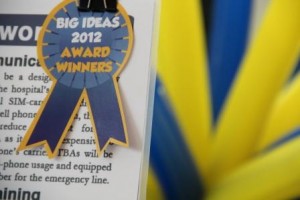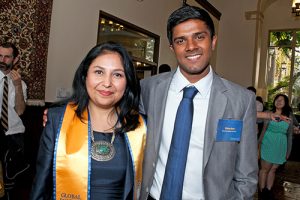Author:
Luis Flores
More than 450 undergraduate and graduate students submitted proposals to one of the Big Ideas@Berkeley’s nine contest categories – representing the largest contest to date. With $300,000 in expected awards, winning proposals will receive the critical support and funding that could spread their idea and address social and global challenges. To the benefit of big ideas everywhere, the opportunity to cultivate innovative plans into real-world projects could soon become available to university students around the country.
 This year, UC Berkeley students interested in the Big Ideas@Berkeley contest were presented with two new global challenges: (1) develop a proposal that will preserve of promote the protection of individual’s essential rights and (2) design an innovative solution that will safeguard the health of expectant mothers and young children. Kicking off a dynamic partnership, Big Ideas@Berkeley and U.S. Agency for International Development (USAID) collaborated to open two new contest categories. The new “Maternal & Children Health” and “Promoting Human Rights” contest categories were inspired by USAID’s “Savings Lives at Birth” and “Tech Challenge for Atrocity Prevention” challenges. USAID’s initiatives foster a similar level of creativity by allowing groups of all sizes and from all backgrounds to contribute to addressing these pressing issues. Big Ideas has taken problems important to USAID and challenged UC Berkeley students to address them.
This year, UC Berkeley students interested in the Big Ideas@Berkeley contest were presented with two new global challenges: (1) develop a proposal that will preserve of promote the protection of individual’s essential rights and (2) design an innovative solution that will safeguard the health of expectant mothers and young children. Kicking off a dynamic partnership, Big Ideas@Berkeley and U.S. Agency for International Development (USAID) collaborated to open two new contest categories. The new “Maternal & Children Health” and “Promoting Human Rights” contest categories were inspired by USAID’s “Savings Lives at Birth” and “Tech Challenge for Atrocity Prevention” challenges. USAID’s initiatives foster a similar level of creativity by allowing groups of all sizes and from all backgrounds to contribute to addressing these pressing issues. Big Ideas has taken problems important to USAID and challenged UC Berkeley students to address them.
In addition to expanding the number of categories in the contest, the Big Ideas team is working to expand the contest to other universities. We’re currently working to develop “Big Ideas in a Box,” explained Jessica Ernandes, a graduate student assistant for the Big Ideas contest. “Our goal is to share the framework and process with other universities so they have the tools that have proven useful for us.”
While still at an early stage of development, this collection of documents will detail everything needed to manage a university-based innovation competition. The idea to replicate this contest was prompted by the recently announced Higher Education Solutions Network (HESN). In partnership with USAID, UC Berkeley is working with six other universities to share and develop technologies and practices needed to collaboratively address global problems. A key piece of this effort is focused on challenging and preparing the next generation of innovators and entrepreneurs.
That’s where Big Ideas@Berkeley comes in. The contest succeeds because it does not simply grant prize money. The contest application process itself is an ecosystem for nurturing social innovation. From the pre-proposal phase, Big Ideas provides guidance, mentorship, and support to applicants, allowing students to grow their ideas during the 8-month long contest. This key feature should be central to any Big Ideas contest replica. “To foster student innovation, you have to know where students need support and what they’d like to get out of a program like Big Ideas,” explained Ernandes. “Listening to them is a necessary first step to ensure that the Big Ideas competition continues to be relevant and impactful as it moves to other campuses.”
The growing focus on university students is encouraging to Alexa Koenig, interim executive director of UC Berkeley’s Human Rights Center. A judge for the “Promoting Human Rights” contest category, Koenig believes young people are the best problem solvers. “Students are constantly being exposed to new ideas, whether from their professors, events on and off campus, or their peers, which can contribute significantly to creativity,” she explained.
“Big Ideas in a Box” is only one of many collaborative projects that will come out of the HESN, but it is a significant one. The Big Ideas competition will provide a pipeline of essential interdisciplinary and intergenerational perspectives on how to develop solutions to address social challenges.
It may not be long until students can apply to Big Ideas at universities throughout the country and the world. “In many ways, I think our model can be replicated because it is, at its heart, really simple,” explained Ernandes, “we support and allow students to do what they are great at being passionate, smart, and creative.”







